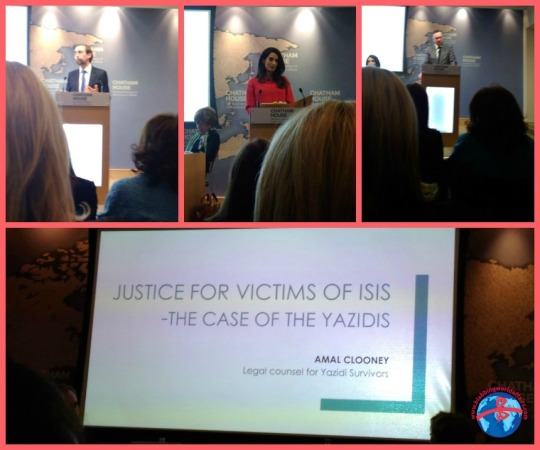On Wednesday, 29 March I had the great pleasure to attend the event Accountibility: International crimes in Syria and Iraq organized by Chatham House in London.

The event was held in memory of the late John Jones QC, with the co-organization of Doughty Street Chambers, and the chair of the event, Elizabeth Wilmshurst revealed plans to make this an annual gathering with worthy topics. First up to speak a few words about Mr. Jones was one of his former colleagues, head of Doughty Street International, Steven Powles.
Then the floor was taken by the panelists to talk about what can be done to charge ISIS members for the serious international crimes committed day by day in Syria and Iraq.
The first speaker was UN High Commissioner for Human Rights Zeid Raad Al Hussein. Speaking about the need to hold accountible the perpetrators of such crimes, the High Commissioner mentioned the International, Impartial and Independent Mechanism to Assist in the Investigation and Prosecution of Those Responsible for the Most Serious Crimes under International Law Committed in Syra. The IIIM, established by the UN General Assembly, according to the High Commissioner, is a first step, but not enough to get things done. The UN is now putting together a plan and budget for the IIIM, and will be seeking judges and prosecutors for its main positions.
The High Commissioner also spoke about the necessity to start this process on an international level. Syria is obviously not a place to conduct fair trials these days, but Iraq also lacks the necessary resources to do so, although there are some 5000 persons in detention for related crimes in Iraq and many will be charged. There are different alternatives for Iraq in this matter to abide by its international obligations, one of them, namely the notion of hybrid courts was put forth by the Iraqi government.
We learned that although we already have many evidence regarding these crimes, there is still plenty that need to be collected, and evidence is essential for IIIM’s commissions of inquiry to start doing their jobs connecting evidence with perpetrators in order to be able to charge them.

Amal Clooney, human rights lawyer, barrister at Doughty Street Chambers was next to speak, her main focus being international crimes commited by ISIS against the Yazidis in Iraq. Anyone who followed her recent appearences at the United Nations with her client, Yazidi survivor and activist Nadia Murad, would be familliar with what she had to say.
Crimes being commited by ISIS against the Yazidi community include mass murder of men, sexual enslavement of women and recruiting child soldiers. Ms. Clooney emphasized that the collection of evidence is urgent, because although we do know that they exist, they could be lost if not collected soon enough: mass graves will be contaminated, social media posts of ISIS members will be taken offline, and witnesses might not be willing to come forward.
There are three roads to justice: through the United Nations, prosecution at the International Criminal Court, that have jurisdiction over foreign fighters and prosecution by domestic courts (of which the third speaker told more).
There is a rare understanding and agreement on this issue among UN Security Council members, so in this case justice could uniquely be done. Either Iraq should send a letter, asking the Security Council for an investigation, or there should be a General Assembly resolution, or the Secretary General could also act. Iraq has voiced its support several times over, but has not sent the letter yet, while time is ticking, so action should be taken immediately.
The last panelist to speak was Christian Ritscher, Federal Public Prosecutor of the Federal Court of Justice in Germany. Germany is one of only a very few countries that has tried such cases within their national jurisdiction, in fact the one that deals with the most. Until about 2014 Germany mostly dealt with war crime cases from Sub-Saharan Africa, now with international crimes committed in the past five years. Mr. Ritscher outlined the many obsticles and the small, but meaningful successes of such endevours.
There are thousands of refugees arrived
to Germany
from the region in the past few years, there are many witnesses among them, there are many victims, or in some cases even perpetrators of some of the gravest crimes. Interviewing them is part of a very long and costly process of collecting evidence and bring perpetrators to justice. Mr. Ritscher told the audience that they even have to drop a lot of cases because the evidence is either not enough, of not reliable enough.
Although the process is slow and requires caution, Mr. Ritscher could also report on successes of the German courts, including the one when based on the evidence collected, one particular person was identified and a German judge could issue an arrest warrant.

After the three talks, Elizabeth Wilmshurst opened the floor for questions, of which there were many that further illuminated details of this very important topic. Questions touched upon practical details of accountibility, like where to prosecute and where to keep the indicted, what are the accurate numbers of victims of ISIS, or what about crimes committed by other groups in the region.
Since the event has taken place on the very day when Britain triggered Article 50, this question also popped up here and there throughout the evening, in the form of whether Britain is going to loose at least some of its international influence once the seccession is done, to wich Ms. Wilmshurst gave the short and diplomatic answer that “we all hope it will not”.
All in all, it was a well organized, well executed professional event, many thanks to Chatham House and all the panelists for it!

